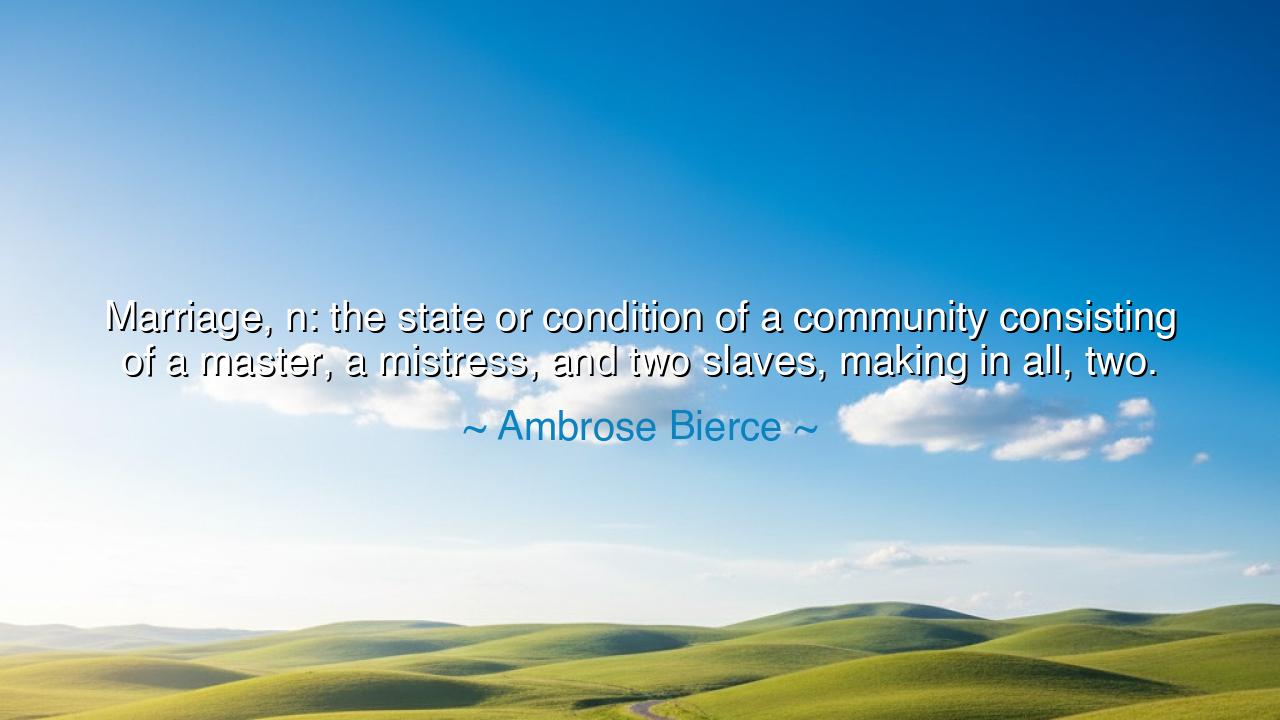
Marriage, n: the state or condition of a community consisting of
Marriage, n: the state or condition of a community consisting of a master, a mistress, and two slaves, making in all, two.






“Marriage, n: the state or condition of a community consisting of a master, a mistress, and two slaves, making in all, two.” Thus wrote Ambrose Bierce, the sharp-tongued chronicler of irony and truth, whose wit cut deeper than the edge of any sword. In his Devil’s Dictionary, he spoke not as a cynic alone, but as one who had seen the comedy and tragedy of human love woven together like a tapestry of silk and thorn. In this definition—mocking yet profound—he unveils the eternal paradox of marriage: that within this sacred union, each partner may strive to rule, yet both must also learn to serve. It is at once a bond of power and surrender, of freedom and devotion. And thus, in the mystery of love, the master and the slave become one.
Ambrose Bierce, a man whose life was scarred by war and loss, wrote in an age when marriage was often bound by duty more than affection, and appearances more than truth. His humor was the armor of a wounded soul. Yet behind his jest lies wisdom born of observation—that love, when it becomes shared life, demands a strange and holy servitude. In the beginning, each lover seeks mastery: to be adored, to be obeyed, to be fulfilled. But soon both discover that the only way to rule the heart of another is through submission, the only way to be free is through devotion. Thus, Bierce’s satire reveals the great law of love: that in marriage, no one truly commands, and no one truly yields—they are both captives of the same chain, forged by choice and sustained by faith.
In the ancient world, poets and philosophers pondered this dual nature of love. The Greeks spoke of Eros, fierce and consuming, and Agape, patient and selfless; both living in tension within the heart of every union. To love is to desire mastery—to wish the beloved to be yours and yours alone. Yet to love deeply is also to serve willingly, to place another’s joy above one’s own. This, perhaps, is the riddle that Bierce, beneath his laughter, sought to expose: that in marriage, both partners are sovereign and servant at once. The “master and mistress” are titles of pride, but the “two slaves” are the truth of endurance.
Consider the story of Queen Victoria and Prince Albert, whose marriage, though crowned in majesty, was built on mutual sacrifice. The queen ruled an empire, yet in the private halls of her heart, she bowed before her husband’s counsel. Albert, in turn, laid aside ambition to serve as her confidant, her conscience, and her compass. To the world, they were regal—masters of millions—but to each other, they were simply devoted slaves to duty and affection. Their union endured not because of equality of power, but because of equality in love’s service. Bierce might have smiled upon such a tale, for it proves his paradox true: that two who bind themselves in marriage are both rulers of each other and servants of the same vow.
The irony of Bierce’s quote also carries a deeper warning. When the balance of mastery and servitude is lost, when pride conquers humility, marriage crumbles. The “community of two” becomes a battlefield of wills. Each seeks to rule, and neither remembers that love was never meant to be an empire but a covenant. In laughter, Bierce reminds us that even as lovers dream of harmony, they are still human—full of contradiction, forever struggling between desire and duty. Yet the highest marriages, though never free of struggle, find beauty in this very tension. They understand that love is not a throne to be ascended, but a burden to be carried together.
To those who hear these words, the lesson is clear: marriage is not about domination, but about mutual surrender. Seek not to be the master, nor the slave, but the partner who understands that both roles must be lived and transcended. The wise learn that love’s true strength lies not in ruling, but in yielding with grace; not in demanding, but in giving without measure. When both submit to the higher power of compassion, they become not captives, but companions, bound not by chains but by choice.
So remember, children of the heart: when Ambrose Bierce jested that marriage is a house of masters and slaves, he spoke a truth cloaked in satire. He saw that love humbles even the proudest soul and softens even the hardest will. To love is to lose the illusion of mastery and to find joy in service. Thus, the secret of a lasting union is not freedom from bondage, but the freedom within it—the liberty born of mutual devotion. For in that sacred servitude, where both kneel not before each other but before love itself, two souls, once divided, at last become one.






AAdministratorAdministrator
Welcome, honored guests. Please leave a comment, we will respond soon